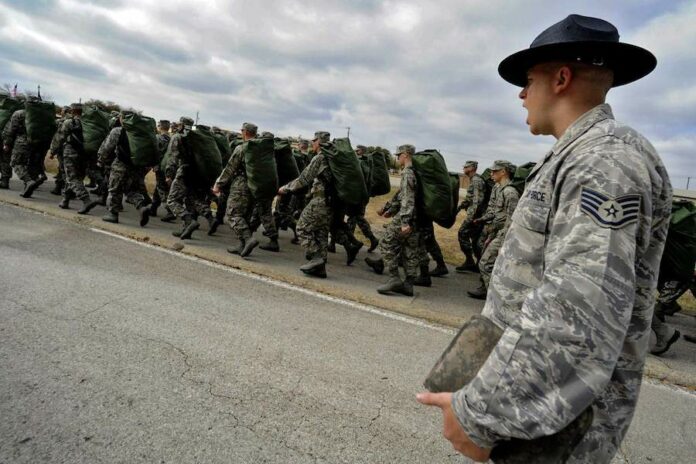The reality of recruitment means everyone deserves a chance to serve
It wasn’t long after my freshman year of high school that I developed a plan that’s exceedingly common for young men trying to figure themselves out: I would join the military. There would be no question because it runs in the family. My great-grandfather fought in the Pacific in World War II, my grandfather served in Vietnam and my dad was a naval officer in the early ’90s. Uncles, cousins — it seemed like everyone had served, so why couldn’t I?
I was pumped-up on teenage testosterone. My preparation cycle would go something like this: adopt an all-too-advanced pull-up regimen from SEAL forums; rise at the crack of dawn every day and run a few miles; research military branches and gloss over everything besides the Navy, as was the general tradition in my family; fight the urge to listen to the infamous lies recruiters tell in order to meet unreachable quotas and invigorate my inner gung-ho to be the best recruit ever. I was going to fight bad guys from the deck of a destroyer or a carrier, or from inside a submarine — in hindsight, completely ignoring the realities of contemporary military service, and just life in general. It ain’t like the movies!
My dreams were squelched when I failed a medical screening. I had a “history of shoulder instability” stemming from a surgically-repaired labrum, and a degree of scoliosis that breached the acceptable limits. The risk of a recurring shoulder injury and the general uncertainty regarding a curved spine proved to be disqualifying. Perhaps it had to do with costs — the military has enough budgetary woes beyond fronting expensive treatments for already-unhealthy candidates. Or maybe it had to do with efficacy in the field. Who wants a guy with a shaky back watching his own?
It sucked, of course. I could have grinded out another application and hoped for a better result. But the denial served a crushing blow to my sense of self-worth. The U.S. Department of Defense is the largest employer on the planet. How do you win a second chance with those guys? It seemed impossible to simply serve my country. I imagine it’s the same with people entrenched in the transgender military ban. How do we express our love of our country when we’re disqualified for things outside our control?
In 2016, President Barack Obama revoked the long-standing ban on transgender people serving in the military. His congressional opponents quickly conflated the policy with the fight over transgender bathroom rights, lamenting the new practice of legislating by executive fiat. The fight continued when President Donald Trump reinstated the ban in 2017 — without the instinctual awareness to inform his own defense secretary. This ban was temporarily upheld by the Supreme Court on Jan. 22, while lower courts hear appeals cases.
Some claim that opening the military to transgender people will necessitate undue costs for hormonal therapy and surgery, while also affecting combat readiness. Others claim that the cost of surgery and hormones — which aren’t always undertaken by transgender people anyway — is negligible in a defense budget dwarfing that of other federal departments.
The case is clear, even among top military brass. All four service chiefs are on record saying there’s no problem with transgender troops for morale and unit efficiency. A RAND Corporation study found that the health cost of fielding transgender troops is “relatively low.” Eighteen countries currently allow transgender troops in combat roles, and there doesn’t seem to be a problem with reduced operational efficiency or cohesion.
In most respects, military screening makes sense, as much as it affects people who passionately want to serve their country. The afflictions run the gamut — a history of surgery, musculoskeletal problems, asthma and disease. The list is long. And while there was disappointment on my end, and no doubt for everyone else who fails to clear these hurdles, there’s a certain logic behind denying us.
But military recruitment is at an impasse. The Army fell 10,000 recruits short of its annual enrollment goal for the 2018 fiscal year. A report by the Office of People Analytics found that interest in joining the military among young people was at a ten-year low in 2017. With a strong economy, finding new recruits may become more difficult. Decade-long wars have jaded the American public. These new realities should encourage policy-makers to look at easing recruitment standards. Instead, Trump’s transgender ban only makes the problem worse.
Considering the fact that less than a third of young Americans are even qualified for military service, the ban also reeks of impracticalities. A nation’s military should have no qualms about strict discrimination on the basis of mental or physical readiness — except when recruitment numbers are low and American military power is facing questions over NATO alliances, Russian aggression and Chinese intransigence. In that case, initial recruiting standards should be eased to fulfill national defense requirements. And here we are, facing these exact issues and still arguing over nonsensical “bans.”
Staring rejection in the face isn’t fun. I tried to join the military, and I failed. We should give more opportunities to people who also want to try. Transgender people deserve a shot at joining a cause greater than themselves, just like anyone else. Taking that away only softens our claim to have the “greatest military in the world.” We don’t want to lose that distinction now, do we?
Written by: Nick Irvin — ntirvin@ucdavis.edu
Disclaimer: The views and opinions expressed by individual columnists belong to the columnists alone and do not necessarily indicate the views and opinions held by The California Aggie.





Thank you for your commitment to social justice, and for your family’s service to our country. In solidarity – Megan Kennedy, ’14, US Army Veteran/US Navy Veteran Dependent, Founder/Leader, UC Davis Military Network, CAAA